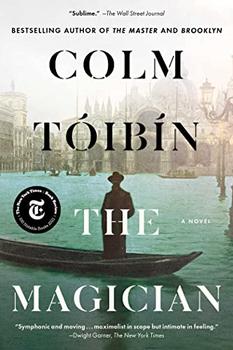Summary | Excerpt | Reading Guide | Reviews | Beyond the Book | Readalikes | Genres & Themes | Author Bio

A Novel
by Colm Toibin
Heinrich, of course, knew who he was, and was aware enough of his younger brother's dream life to realize not only that it exceeded his own in scope and scale, but that, as he warned him, the more Thomas extended his ability to dissimulate, the greater the danger of being found out. Heinrich, unlike his brother, made himself clear to the household. His fascination, as he grew into his teens, with Heine and Goethe, with Bourget and Maupassant, was as transparent as his indifference to ships and warehouses. He saw these latter things as dull, and no amount of admonishment could prevent him from emphasizing to his father that he wanted nothing whatsoever to do with the family business.
"I saw you over lunch doing an imitation of a little businessman," he said to Thomas. "Everyone was fooled except me. When are you going to let them know that you are only pretending?"
"I am not pretending."
"You don't mean a word of it."
Heinrich had developed a way of disassociating himself so completely from the family's main concerns that his father learned to leave him alone, concentrating instead on correcting small failures in the manners or bearing of his second son and his two daughters. Julia tried to interest Heinrich in music, but he did not want to go on playing the piano or the violin.
Heinrich would, Thomas thought, have become totally detached from the family had it not been for his intense devotion to his sister Carla. There were ten years between the two, so that Heinrich's response to his sister was more fatherly than brotherly. From the time she was a baby, Heinrich carried Carla about the house. And then, as she got older, he taught her card games and played a gentle version of hide-and-seek in which only they were involved.
His affection for Carla allowed others to admire the softness in him, the consideration. Even though he had friends and manly activities to attend to, Heinrich would react to Carla's demands with tenderness. If Lula became jealous of the attention paid to her sister, Heinrich would include her too, but she often grew bored as her sister and her older brother appeared to have a private way of communicating with and amusing each other.
"Heinrich is very kind," a cousin said. "If only he were practical as well, then the family's future would be secure."
"There is always Tommy," Aunt Elisabeth said, turning to Thomas. "Tommy is going to take the firm into the twentieth century. Is that not your plan?"
Thomas would smile as best he could, having noted the faint irony in her tone.
Even though it was believed that his recalcitrance came from her side of the family, Heinrich, as he grew older, began to be bored by his mother's stories, nor did he seem to have inherited her fragility of spirit, her engagement with the rare, the exquisite. Strangely, for all his talk about poems and art and travel, Heinrich, in his air of frankness and determination, was, despite himself, becoming a pure, genuine Mann. Indeed, when he was seen walking through Lübeck, his aunt Elisabeth loved to remark how much he resembled his grandfather Johann Siegmund Mann, how he had the heavy gait that she associated with old Lübeck, and also the ponderous tone of his father's line. It was such a pity that he lacked any enthusiasm for trade.
It was clear to Thomas that the business would, in time, be left to him to manage rather than to his older brother, that the house that had been his grandparents' would eventually be his domain. He could fill it with books, he thought. He saw how he would reconfigure the upstairs rooms and move the offices to some other building. He would order books from Hamburg, as his father ordered his clothes, and from farther afield, perhaps even from France if he could learn to read French, or from London when his English was more fluent. He would live in Lübeck as no one had ever done, with a business that he would have consolidated, enough for it to be merely a way to fund his other concerns. He would like a French wife, he thought. She would add luster to their lives.
Excerpted from The Magician by Colm Toibin. Copyright © 2021 by Colm Toibin. Excerpted by permission of Scribner. All rights reserved. No part of this excerpt may be reproduced or reprinted without permission in writing from the publisher.
Your guide toexceptional books
BookBrowse seeks out and recommends the best in contemporary fiction and nonfiction—books that not only engage and entertain but also deepen our understanding of ourselves and the world around us.